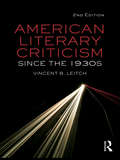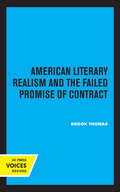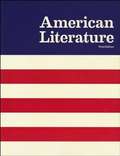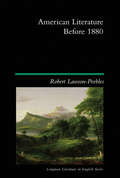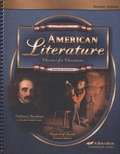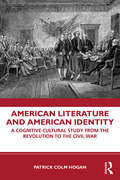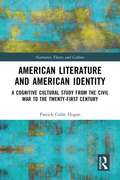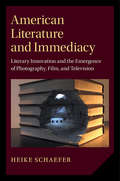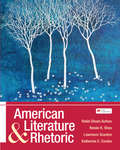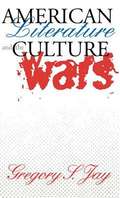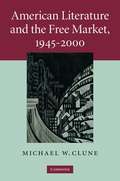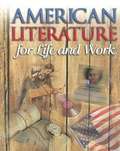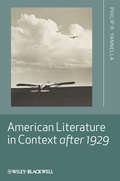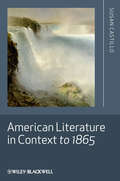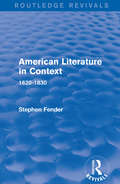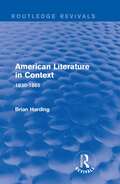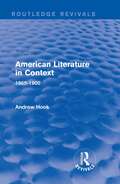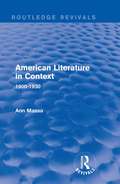- Table View
- List View
American Literary Criticism Since the 1930s
by Vincent B. LeitchAmerican Literary Criticism Since the 1930s fully updates Vincent B. Leitch’s classic book, American Literary Criticism from the 30s to the 80s following the development of the American academy right up to the present day. Updated throughout and with a brand new chapter, this second edition: provides a critical history of American literary theory and practice, discussing the impact of major schools and movements examines the social and cultural background to literary research, considering the role of key theories and practices provides profiles of major figures and influential texts, outlining the connections among theorists presents a new chapter on developments since the 1980s, including discussions of feminist, queer, postcolonial and ethnic criticism. Comprehensive and engaging, this book offers a crucial overview of the development of literary studies in American universities, and a springboard to further research for all those interested in the development and study of Literature.
American Literary Realism and the Failed Promise of Contract
by Brook ThomasThis title is part of UC Press's Voices Revived program, which commemorates University of California Press’s mission to seek out and cultivate the brightest minds and give them voice, reach, and impact. Drawing on a backlist dating to 1893, Voices Revived makes high-quality, peer-reviewed scholarship accessible once again using print-on-demand technology. This title was originally published in `1997.
American Literary Studies
by Michael A. Elliott Claudia StokesAmerican Literary Studies: A Methodological Reader gathers together leading scholars of American literature to address the questions of methodology that have invigorated and divided their field: the rise of interdisciplinarity and the wealth of theoretical methods now available to the critic of American literature. Their engagement with these issues takes a unique form in this book: Each scholar has chosen a methodologically innovative essay, which he or she then introduces, explaining why it is both exemplary in its approach and central to the issues that most engage American literary scholarship today. The book includes both an introduction to the controversial interdisciplinary methods that have made American literary studies such a vibrant field, as well as groundbreaking scholarship on topics as diverse as James Fenimore Cooper, minstrel songs, and Lakota Indian stories. This volume has been designed to serve as a starting point for teachers and students to explore the fundamental questions of American literary scholarship: What does "method" mean in literary studies? Which texts should it study? What makes literary study unique? What should literary scholarship do? American Literary Studies argues that these questions can only be answered through a discussion of the interdisciplinary methods currently in use by scholars today. Finally, an original introduction by Michael A. Elliott and Claudia Stokes explains why questions of method are crucial to American literary studies and how past scholars of American literature have tried to answer them. Contributors include: Lauren Berlant, Russ Castronovo, Wai Chee Dimock, Ann duCille, Michael A. Elliott, Frances Smith Foster, Elaine A. Jahner, Rob Kroes, Arnold Krupat, Paul Lauter, Marilee Lindemann, W. T. Lhamon, Jr., Christopher J. Looby, David Palumbo-Liu, Roy Harvey Pearce, Lora Romero, Ramón Saldívar, Carroll Smith-Rosenberg, Werner Sollors, Claudia Stokes, Claudia Tate, Paula A. Treichler, Priscilla Wald, Michael Warner, Laura Wexler, Sau-ling C. Wong
American Literature
by Paul Garrison Michael Pope Joshua Privett Barbara RooksAcquaint your students with the prose and poetry of American authors from the early days of colonization through the present. Organized chronologically and by context, this textbook covers the historical context, literary movements, and principle players that helped to shape American culture and society. Each lesson is broken down into Before/During/After Reading sections. The first highlights key aspects of literature, explains key concepts, defines vocabulary, and helps orient students to the work. The "during" section presets the literature with side-bar margin questions. The last section includes "Think and Discuss" questions that review and assess comprehension of emphases and ideas. Author Biography pages provide an overview of authors' lives, and Chapter Reviews outline important concepts to help prepare students for tests. Written from a Christian worldview, this course encourages students evaluate literature in the light of Scripture and determine whether or not works are biblically sound.
American Literature
by George KearnsAmerican Literature is an anthology, a collection of fiction, poetry, drama, and nonfiction. The purpose of American Literature is to introduce you to some highly enjoyable writing and to help you think logically and creatively about it. In fact, as the writers in this book so powerfully demonstrate, the more you think about literature the richer your insights will be.
American Literature
by Molly Harrington DuganA collection of literature written by various authors from several different genres. Contains historical info, literary term descriptions, and a study guide.
American Literature Before 1880 (Longman Literature In English Series)
by Robert Lawson-PeeblesAmerican Literature Before 1880 attempts to place its subject in the broadest possible international perspective. It begins with Homer looking westward, and ends with Henry James crossing the Atlantic eastwards. In between, the book examines the projection of images of the East onto an as-yet unrecognised West; the cultural consequences of Viking, Colombian, and then English migration to America; the growth and independence of the British American colonies; the key writers of the new Republic; and the development of the culture of the United States before and after the Civil War. It is intended both as an introduction for undergraduates to the richness and variety of American Literature, and as a contribution to the debate about its distinctive nature. The book therefore begins with a lengthy survey of earlier histories of American Literature.
American Literature Classics for Christians (Fourth Edition)
by Pensacola Christian CollegeLaunch into literature with the exciting stories from Mark Twain, Washington Irving, Edgar Allen Poe, and many more. American Literature is a compilation of short stories, poems, and other selections that are organized by genre to exemplify the specific characteristics of the time period. Learn about the dialects in American legends, irony and satire in the short stories, local color writing during the Realistic period, and the rich imagery during the Romantic Era. With detailed information about the authors and their writing ability, literary terms and definitions, and many selections of American art, this text gives an excellent portrayal of American Literature.
American Literature Classics for Christians (Fourth Edition)
by The Editors at the Pensacola Christian CollegeThe book presents great works of American literature and evaluates them in the light of the truths of God's Word, in order that the student may further understand and articulate truth as God has established it.
American Literature and American Identity: A Cognitive Cultural Study From the Revolution Through the Civil War
by Patrick Colm HoganAmerican Literature and American Identity addresses the crucial issue of identity formation, especially national identity, in influential works of American literature. Patrick Colm Hogan uses techniques of cognitive and affective science to examine the complex and often highly ambivalent treatment of American identity in works by Melville, Cooper, Sedgwick, Apess, Stowe, Jacobs, Douglass, Hawthorne, Poe, and Judith Sargeant Murray. Hogan focuses on the issue of how authors imagined American identity—specifically, as universal, democratic egalitarianism—in the face of the nation’s clear and often brutal inequalities of race and sex. In the course of this study, Hogan advances our understanding of nationalism in general, American identity in particular, and the widely read literary works he examines.
American Literature and American Identity: A Cognitive Cultural Study from the Civil War to the Twenty-First Century (Narrative Theory and Culture)
by Patrick Colm HoganIn recent years, cognitive and affective science have become increasingly important for interpretation and explanation in the social sciences and humanities. However, little of this work has addressed American literature, and virtually none has treated national identity formation in influential works since the Civil War. In this book, Hogan develops his earlier cognitive and affective analyses of national identity, further exploring the ways in which such identity is integrated with cross-culturally recurring patterns in story structure. Hogan examines how authors imagined American identity—understood as universal, democratic egalitarianism—in the face of the nation’s clear and often brutal inequalities of race, sex, and sexuality, exploring the complex and often ambivalent treatment of American identity in works by Charlotte Perkins Gilman, Eugene O’Neill, Lillian Hellman, Djuna Barnes, Amiri Baraka, Margaret Atwood, N. Scott Momaday, Spike Lee, Leslie Marmon Silko, Tony Kushner, and Heidi Schreck.
American Literature and American Identity: A Cognitive Cultural Study from the Civil War to the Twenty-First Century (Narrative Theory and Culture)
by Patrick Colm HoganIn recent years, cognitive and affective science have become increasingly important for interpretation and explanation in the social sciences and humanities. However, little of this work has addressed American literature, and virtually none has treated national identity formation in influential works since the Civil War. In this book, Hogan develops his earlier cognitive and affective analyses of national identity, further exploring the ways in which such identity is integrated with cross-culturally recurring patterns in story structure. Hogan examines how authors imagined American identity—understood as universal, democratic egalitarianism—in the face of the nation’s clear and often brutal inequalities of race, sex, and sexuality, exploring the complex and often ambivalent treatment of American identity in works by Charlotte Perkins Gilman, Eugene O’Neill, Lillian Hellman, Djuna Barnes, Amiri Baraka, Margaret Atwood, N. Scott Momaday, Spike Lee, Leslie Marmon Silko, Tony Kushner, and Heidi Schreck.
American Literature and Immediacy: Literary Innovation and the Emergence of Photography, Film, and Television (Cambridge Studies in American Literature and Culture #184)
by Heike SchaeferThe search for immediacy, the desire to feel directly connected to people or events, has been a driving force in American literature and media culture for the past two centuries. This book offers the first in-depth study of literary immediacy effects. It shows how the heightened reality effects of photography, film, and television inspired American writers to create new literary forms that would enhance their readers' sense of immediate participation in the world. The study combines close readings of Emerson, Whitman, Stein, Dos Passos, Coover, Foster Wallace, and DeLillo with detailed considerations of visual media to open up a new perspective on literary innovation and the ongoing cultural quest for increased immediacy. It argues that we can better understand how American literature develops when we consider experiments with literary form, not only in literary and cultural contexts but also in relation to the emergence of new media, their immediacy effects, and the larger changes in social life that they manifest and provoke.
American Literature and Rhetoric
by Lawrence Scanlon Robin Dissin Aufses Renee H. Shea Katherine E. CordesA book that�s built for you and your students.Flexible and innovative, American Literature & Rhetoric provides everything you need to teach your course. Combining reading and writing instruction to build essential skills in its four opening chapters and a unique anthology you need to keep students engaged in Chapters 5-10, this book makes it easy to teach chronologically, thematically, or by genre.
American Literature and the Culture Wars
by Gregory S. JayIn this book the author states that he will be: "...questioning both the scope and the purpose of American literary studies. What ends do we pursue in the study and teaching of an "American" literature? Has the idea of a canon of great books reached the end of its usefulness? Where does American literature end and Mexican or Caribbean or Canadian or postcolonial literature begin? Is multiculturalism the end of civilization as we know it or the start of an overdue regeneration of our politics and pedagogy? How has the political economy of making ends meet in an era of downsizing and privatization affected academic freedom and the course of academic study? What happens in the classroom when we try to put an end to the conventional ways in which we have conceived and taught our subject? Playing off the pun in the title of this introduction, then, I want to explore this set of questions about the "ends" of American literary studies. This exploration includes rethinking our ends both in the nominal sense of "pragmatic intention" (goal, aim, objective, design, scheme) and in the verbal sense of "reaching a conclusion" (limit, terminate, cease, halt, expire). By focusing attention on these many ends and the controversial issues they involve, I hope in part to explain how this once arcane academic discipline ended up at the center of the culture wars."
American Literature and the Destruction of Knowledge: Innovative Writing in the Age of Epistemology
by Ronald E. MartinIn this challenging work, Ronald E. Martin analyzes the impulse of major nineteenth- and twentieth-century American writers to undermine not only their inherited paradigms of literary and linguistic thought but to question how paradigms themselves are constructed. Through analyses of these writers, as well as contemporaneous scientists, mathematicians, philosophers, and visual artists, American Literature and the Destruction of Knowledge creates a panoramic view of American literature over the past 150 years and shows it to be a crucial part of the great philosophical changes of the period.The works of Melville, Emerson, Whitman, and Dickinson, followed by Crane, Frost, Pound, Stein, Hemingway, Dos Passos, Aiken, Stevens, and Williams, are examined as part of a cultural current that casts doubt on the possibility of knowledge itself. The destruction of concepts, of literary and linguistic forms, was for these writers a precondition for liberating the imagination to gain more access to the self and the real world. As part of the exploration of this cultural context, literary and philosophical realisms are examined together, allowing a comparison of their somewhat different objectives, as well as their common epistemological predicament.
American Literature and the Free Market, 1945–2000
by Michael W. CluneThe years after World War Two have seen a widespread fascination with the free market. Michael W. Clune considers this fascination in postwar literature. In the fictional worlds created by works ranging from Frank O'Hara's poetry to nineties gangster rap, the market is transformed, offering an alternative form of life, distinct from both the social visions of the left and the individualist ethos of the right. These ideas also provide an unsettling example of how art takes on social power by offering an escape from society. American Literature and the Free Market presents a new perspective on a number of wide ranging works for readers of American post-war literature.
American Literature for Life and Work
by Christine Bideganeta Larocco Elaine Bowe JohnsonThe four-volume Literature for Life and Work series continues with American Literature for Life and Work(Grade 11). These literature selections challenge students to think critically, work together in teams, and reflect on universal themes in life and work by reading selections from great American literature.
American Literature in Context after 1929
by Philip R. YannellaThis book situates American literature from the Great Depression to the present day in its historical contextExplores the issues that engaged American writers from 1929 to the presentDraws on a range of documents from magazine and newspaper accounts to government reports and important non-fictionThe book covers political ferment of the 1930s; post-World War II anti-Communism; post-War affluence; suburbanization and demographic change; juvenile delinquency, mental illness and the perception of the U.S. as a "sick" society; and post-1965 immigrationDesigned to be compatible with the major anthologies of literature from the periodEquips students and general readers with the necessary historical context needed to understand the writings from this period and provides original and useful readings that demonstrate how context contributes to meaning Includes a historical timeline, featuring key literary works, American presidents, and historical events
American Literature in Context to 1865
by Susan CastilloAmerican Literature in Context to 1865 discusses the issues and events that engaged American writers of the period, providing original and useful readings of important literary works that demonstrate how context contributes to meaningCovers a range of genres including the myths, chants and songs of indigenous cultures, sermons, slave narratives, essays and the novels and poetry to 1865Designed to be used alongside the major anthologies of literature from the periodEquips students with the necessary historical context needed to understand the writings from this periodPedagogical features include a detailed bibliography, and a transatlantic timeline, with literary works, and historical events
American Literature in Context: 1620-1830 (Routledge Revivals: American Literature in Context)
by Stephen FenderFirst published between 1982 and 1983, this series examines the peculiarly American cultural context out of which the nation’s literature has developed. Covering the years from 1620 to 1830, this first volume of American Literature in Context examines a range of texts from the writings of the Puritan settlers through the declaration of Independence to the novels of Fenimore Cooper. In doing so, it shows how early Americans thought about their growing nation, their arguments for immigration, for political and cultural independence, and the doubts they experienced in this ambitious project. This book will be of interest to those studying American literature and American studies.
American Literature in Context: 1830-1865 (Routledge Revivals: American Literature in Context)
by Brian HardingFirst published between 1982 and 1983, this series examines the peculiarly American cultural context out of which the nation’s literature has developed. Covering the years from 1830 to 1865, this second volume of American Literature in Context examines twelve major American writers of the three decades before the Civil War, including Edgar Allan Poe, Ralph Waldo Emerson, Henry David Thoreau, Herman Melville and Walt Whitman. The book also analyses the writing of two contemporary historians, an intellectual Journalist and Abraham Lincoln. Among the major themes discussed the religious heritage of New England Transcendentalism, sectional rivalries, tensions between self-culture and social awareness, and the widening gulf between the idea of national destiny and the fact of growing disunity. In addition, the dominant literary forms of the period – sermon, essay, travelogue – are related to the common cultural assumptions of the age. This book will be of interest to those studying American literature and American studies.
American Literature in Context: 1865-1900 (Routledge Revivals: American Literature in Context)
by Andrew HookFirst published between 1982 and 1983, this series examines the peculiarly American cultural context out of which the nation’s literature has developed. Covering the years from 1865 to 1900, this third volume of American Literature in Context focuses on the struggles of American writers to make sense of their rapidly changing world. In addition to such major figures as Walt Whitman, Henry James, Emily Dickinson and Mark Twain, it analyses the writings of an unorthodox economist (Henry George), a Utopian reformer (Edward Bellamy) and a critical sociologist (Thorstein Veblen). Particular attention is paid to the challenge to conventional literary and cultural values represented by writers such as William Dean Howell who pursued a new form of scientific, democratic realism in American writing. This book will be of interest to those studying American literature and American studies.
American Literature in Context: 1900-1930 (Routledge Revivals: American Literature in Context)
by Ann MassaFirst published between 1982 and 1983, this series examines the peculiarly American cultural context out of which the nation’s literature has developed. Covering the years from 1900 to 1930, this fourth volume of American Literature in Context focuses on how American literature dealt with the challenges of the period including the First World War and the stock market crash. It examines key writers of the time such as Henry James, Gertrude Stein, Ezra Pound, F Scott Fitzgerald and Eugene O’Neill who, unlike many Americans who sought escape, confronted reality, providing a rich and varied literature that reflects these turbulent years. This book will be of interest to those studying American literature and American studies.
